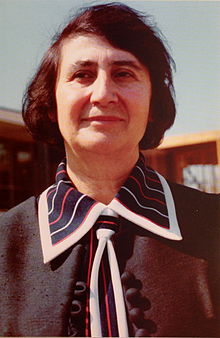Maro Markarian: Difference between revisions
removed Category:Armenian poets; added Category:Armenian women poets using HotCat |
|||
| Line 35: | Line 35: | ||
{{DEFAULTSORT:Markarian, Maro}} |
{{DEFAULTSORT:Markarian, Maro}} |
||
[[Category:Armenian women poets]] |
[[Category:Armenian women poets]] |
||
[[Category:Armenian-language women poets]] |
|||
[[Category:1915 births]] |
[[Category:1915 births]] |
||
[[Category:1999 deaths]] |
[[Category:1999 deaths]] |
||
Revision as of 02:50, 21 August 2020

Maro Yeghishe Markarian (Armenian: Մարո Եղիշեի Մարգարյան) (December 22, 1915, Shulaver, Marneuli region, Georgia – January 28 or 29, 1999, Yerevan, Armenia (buried in Byurakan)) was an Armenian poet, translator, member of the USSR Writers Union since 1937.[1]
Biography
Maro Margaryan was born December 22, 1915 in Shulaver (now Shahumyan or Shahumian village, Marneuli region of Georgia) to peasant parents. Markarian received her initial secondary education in her hometown through means of local schooling. Markarian was later fortunate to attend the Academy of Painting in 1933 found in Tiflis.[1] Later in 1938 she graduated from the University of Yerevan from the department of literature.[2] She then studied in the postgraduate course of the Armenian branch of the USSR Academy of Sciences. His first poem was published in 1935. 1967–1984 He worked in the Committee for Cultural Relations with the Diaspora.
The main themes surrounding Markarian's poetry formulates around topics love, love, human relations, and the homeland,. Margaryan's poems have been translated and published in separate books in Russian.
She died on January 28 or 29, 1999, in Yerevan, Armenia and is currently buried in Byurakan
Family
- Brother: Benjamin Margaryan, astronomer
- Husband: Sargis Bayandur, art critic, Honored Art Worker of the Republic of Armenia
- Daughter: Anahit Bayandur, Armenian translator, Member of the Supreme Council of the First convocation of the Republic of Armenia, human rights activist
- Son: Ashot Bayandur, painter
Literature
- Felix Bakhchinyan, Kingdom of Nostalgia, Yerevan, 2003.
- Naira Hambardzumyan, Maro Markarian's lyric poetry, Yerevan, 2003.
Achievements
- Order of Friendship of Peoples, 1985
- Laureate of the USSR State Prize (1983, for the collection of poems "Donations")
- Laureate of the Avetik Isahakyan Prize 1981 (for the collection of poems "Donations")
References
- ^ a b Rowe, Victoria (2003). A History of Armenian Women's Writing, 1880–1922. Cambridge Scholars Press. ISBN 978-1-904303-23-7.
- ^ "Maro Markarian". TheFreeDictionary.com. Retrieved 2020-06-03.
- "Maro Markarian". The Great Soviet Encyclopedia. Retrieved 2020-06-02 – via TheFreeDictionary.com.
